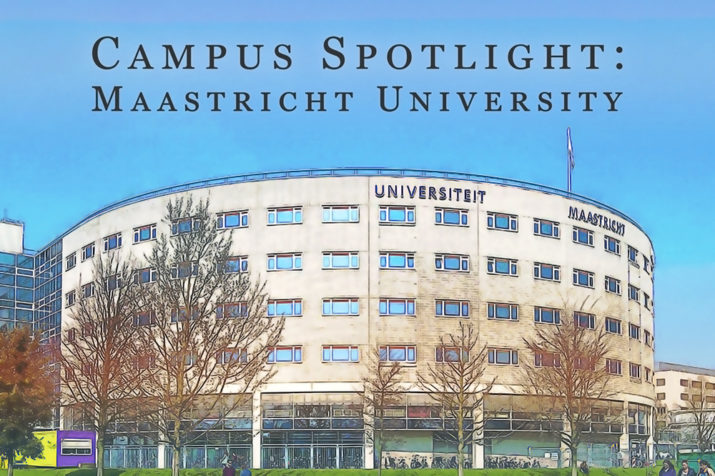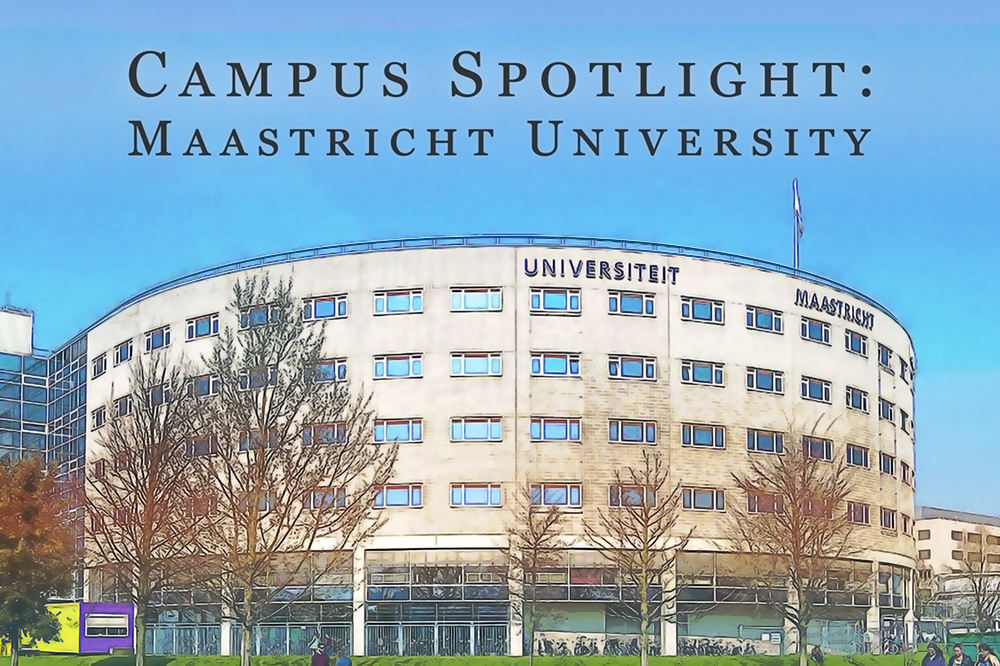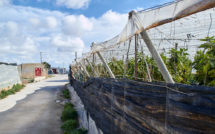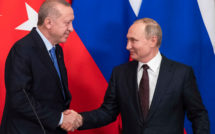

A spotlight on Maastricht University.
With Berlin, Brussels, and Rome, the city of Maastricht is symbolic of the making of Europe. At the confluence of the Meuse and Geer (Jeker) rivers, nested in the southern tip of the Netherlands, near the Belgian border and close to Germany, Maastricht has been a European crossroad for centuries. Already a place of encounter and passage in the Middle Ages, its brick urban landscape has embodied the destiny of modern Europe since the 1992 signature of the Maastricht Treaty (effective in 1993) that gave life to the EU, the Euro, and European citizenship, thereby comforting exchanges across the Union and somewhat erasing the previous repute of the city as the site where Charles de Batz-Castelmore d’Artagnan―beloved musketeer―met his deadly fate in the course of the famous siege of the city during the war between the Dutch and the French.
Today, having capitalized on its geographic location and emblematic character as one of the most European cities, Maastricht boasts a large student population, many of them coming from other European member-states via the Erasmus program to study at Maastricht University (UM). One of the youngest universities in the Netherlands (established in the mid-1970s), UM has consistently received high praises and favorable rankings for its undergraduate or graduate programs, recently placing in an enviable sixth position in the latest 2020 Times Higher Education (THE) list of young universities under fifty.[1] The osmosis between the city and the university has been palpable since the opening of UM and was markedly highlighted when they came together ― along with the region― in 2017 on the occasion of the twenty-fifth anniversary of the Treaty, to create “Maastricht, Working on Europe,” a program meant to foster future research on the European Union. This multi-partite collaboration is but one example of the ways in which the city governance is keen to make Maastricht meet global expectations and remain a meaningful representative of the European project and ideal. What is it like to study, teach, and research Europe in a place with such mystique in the European imagination?
A vibrant research environment and incubator of ideas
The contributors to this campus spotlight have joined to open a window onto Maastricht University as they share their research endeavors and pedagogical practices. Neculai-Cristian Surubaru rounded up some of his colleagues at Studio Europa Maastricht (SEM),[2] a research initiative created to deliver on the “Maastricht, Working on Europe” agenda. Together, they provide insights into the mission of the program and the various projects in which they are involved, making recommendations for further investigative paths that will be useful to other Europeanists. From the east-west divide, to migration, food and health, and social media and human rights, these objects of study lead to the formulation of responses to crucial contemporary questions about the role of Europe in the global arena, EU legitimacy and actors, fairness and social justice in Europe, digitization and new technologies, and quality of life in a greener Europe. Further unveiling the type of research conducted at MU, Eline Schmeets and Akudo McGee interviewed Mathieu Segers, Chair of the Academic Board for the “Maastricht, Working on Europe” program. In their conversation, he discusses his first contact with Europe as a concept, the direction he seeks to take in leading the program, the importance of translating research to reach audiences outside academia and how universities can support this endeavor, as well as a host of other burning topics in social and political Europe. Adding to the overview of the research orientation at MU, Pablo del Hierro focuses on the rise of the far right in Europe and beyond. He advocates for a necessary “historical approach to understand current developments at the right of the right of the political spectrum” and demonstrates that studying neo-fascism transnationally and in the longue durée renders apparent the continuities that exist between today’s far-right activists and interwar fascism.
A place of innovative pedagogy centered on students’ autonomy and problem-based learning
Exchanges with MU educators quickly make clear their complete dedication to students and acute interest in innovative pedagogies. In his interview, Patrick Bijsmans, who greatly assisted with rallying many of the participants in this Campus Spotlight, gives an excellent overview of the teaching philosophy and pedagogical landscape at MU in the context of the city of Maastricht where European foundational principles and aspirational dreams converge. He explains his trajectory in the academe, his passion for teaching and learning, not only as he instructs students according to the problem-based approach that is widely privileged at MU, but also as a teachers’ teacher when he trains the faculty to keep them abreast of the latest pedagogical research and educational methods. He is joined by several of his colleagues who reveal some of their teaching strategies and recent experiences. Elissaveta Radulova delves into problem-based learning (PBL) and interdisciplinarity in European studies, describing the PBL model as one where constructive dialogue, small-scale collaboration, and student self-directedness prime. In her article, Marisa Mori provides practical illustrations of PBL, offering concrete examples of assignments out of her course on Negotiation Skills. She shares helpful instances of simulations, tutorials, and supporting readings that will be invaluable to anyone who would like to experiment with PBL. In her contribution, Christine Neuhold describes her experience directing student theses in the time of COVID-19, relating students’ successes and difficulties in the new all-virtual learning environment, as well as her own. Finally, Marie Labussière shares her journey from her experience as a social science student studying mathematics in an engineering program to becoming a teacher in a field about which she had to learn everything upon arrival at MU ―object of study to methodologies. In her article, she also explains how, as a quantitative researcher, she developed an appreciation for interdisciplinarity and discovered herself to be a good fit for it.
This Campus Spotlight would not be whole without a return from the classroom. Camilo Erlichman graciously supplies his syllabus for his course on “The Making and Unmaking of Political Orders since the French Revolution,” giving a practical outlook on how a PBL course can be organized and delivered. It is also exciting to be able to feature works by three graduating BA students. Assembled in a virtual roundtable and introduced by Patrick Bijsmans, these student contributions emanate from European Studies BA final theses and convey the breadth of interests that MU students are encouraged to pursue. Dominik Schmidt analyzes Greta Thunberg’s public speeches on climate change through the lens of post-populism, while Kirstin Herbst compares the EU and the UNFCCC in public climate finance implementation. Johanna Hvalic completes the panel with an original paper applying critical discourse analysis to the portraying of Lady Hester Lucy “going native” during the early Victorian era. These three student pieces are testament not only to the value of the PBL method, but also to the commitment of their authors as they come to the end of their time at MU after an unusual year and in a general context of doubts and uncertainties due to the lasting pandemic.
It has been a great pleasure to connect with scholars, educators, and students at Maastricht University and to be met with such collegiality and collaborative spirit, especially given the difficult circumstances faced by all under COVID-19 various lockdown measures. Their eagerness to participate in this group effort has been wonderfully uplifting, and can only trigger inspiration and bolster pride for what has been accomplished in the European project, while encouraging high hopes for what is yet to come.
Hélène B. Ducros is a human geographer (PhD University of North Carolina-Chapel Hill). She studies lived space, place-making, attachment to place, and landscape change and perception. Her research has inquired into rural transformations and rural-urban dynamics through an understanding of heritage preservation schemes. She has taught an array of courses in geography, history, and international studies and is most interested in experiential and place-based pedagogies and how to make meaningful connections with the real world in the classroom.
Campus Spotlight: Maastricht University
-
“European Integration after Maastricht: Insights, Novel Research Agendas, and the Challenge of Real-World Impact” by Neculai-Cristian Surubaru, Caterina di Fazio, Miriam Urlings, Catalina Goanta, Thales Bertaglia, and Mathieu Segers
-
“Indirect Interventions: Teaching at the Intersection of Problem Based Learning and Skills Courses” by Marisa Mori
-
“From Engineering Student to Teacher in European Studies: Making the Most of Both Worlds” by Marie Labussière
-
“Teaching Europe in the Birth Place of the European Union: An Interview with Patrick Bijsmans” by Hélène B. Ducros
-
“Thesis Trajectories and Defenses in Times of COVID-19” by Christine Neuhold
-
“State of the Union and Speaking Europe: An Interview with Mathieu Segers” by Eline Schmeets and Akudo McGee
-
“European Studies at Maastricht University: Problem-Based, Interdisciplinary, and International” by Elissaveta Radulova
-
“Understanding the Rise of the Far Right: The Need for a Historical Approach” by Pablo del Hierro
-
“Syllabus: Ruling Europe: The Making and Unmaking of Political Orders since the French Revolution” by Camilo Erlichman
A Roundtable on Maastricht University Student Research
-
Introduction by Patrick Bijsmans
-
“Post-Political Populism as the Elephant in the Room: A Critical Discourse Analysis of Greta Thunberg’s Public Speeches on Climate Change” by Dominik Schmidt
-
“Women “Going Native” During the Early Victorian Age: The Case of Lady Hester Lucy Stanhope (1776 – 1839)” by Johanna Hvalic
-
“Delegating, but How? A Comparison between the EU and the UNFCCC as Principals in Public Climate Finance Implementation” by Kirstin Herbst
References:
[1] For full ranking report, visit https://www.timeshighereducation.com/student/best-universities/best-young-universities-world#survey-answer
[2] For more information, visit https://maastrichteurope.nl/
Published on November 9, 2020.




